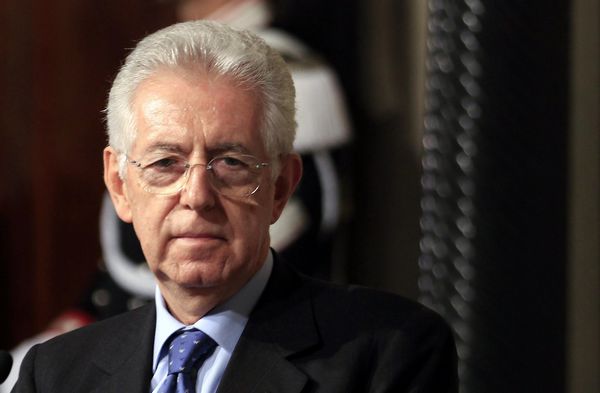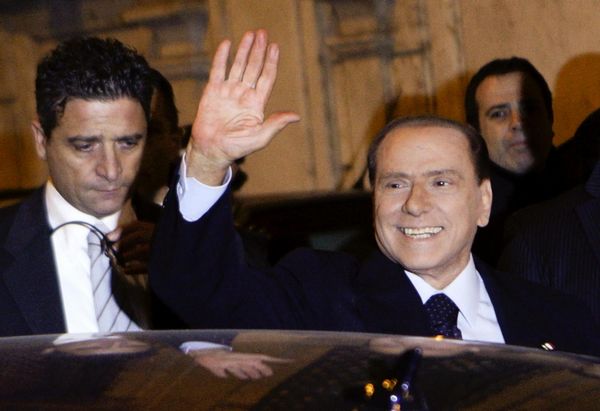Monti appointed as new Italian PM
Updated: 2011-11-14 06:27
(Agencies)
|
|||||||||||
ROME - Italy's president appointed former European Commissioner Mario Monti on Sunday to head a new government charged with implementing urgent reforms to end a crisis that has endangered the whole euro zone.
 |
|
Newly appointed Prime Minister Mario Monti looks on following a talk with Italian President Giorgio Napolitano at the Quirinale palace in Rome November 13, 2011.[Photo/Agencies] |
After a frenetic weekend during which parliament passed the reforms and Prime Minister Silvio Berlusconi stepped down to the jeers of hostile crowds, President Giorgio Napolitano asked Monti to form a government, expected to be composed largely of technocrats.
The respected economist, made a life Senator last week, said he would work urgently to form a government and is likely to name around 12 ministers within days.
"I intend to fulfil this task with a great sense of responsibility in the service of our country. In a moment of particular difficulty for Italy, in a turbulent situation for Europe and the world, the country needs to meet the challenge," Monti said after his nomination.
"We owe it to our children to offer them a future with dignity and hope," he added.
A process that normally takes several days or weeks was completed over the weekend as Napolitano raced to restore market confidence, which collapsed disastrously last week.
After nominating Monti, the president said that Italy must make an extraordinary effort to overcome the crisis and to restore the trust of investors and European institutions.
Italy's borrowing costs soared to unmanageable levels last week, threatening a Europe-wide financial meltdown.
Markets calmed down at the end of the week once it became clear that Berlusconi would go and Monti would take his place. Rome will watch on Monday to see if the formal nomination will continue the positive effect on markets.
If Monti manages to secure enough backing in parliament, he will implement reforms agreed by Berlusconi with euro zone leaders to cut Italy's massive debt and revive a chronically stagnant economy.
There are clear signs that he will face problems, with Angelino Alfano, secretary of Berlusconi's PDL party, saying there was "huge opposition" in its ranks to a Monti government.
Alfano said after meeting Napolitano on Sunday afternoon, however, that the party - which has been badly split by the crisis - would support Monti.
Uphill Battle
Outgoing Interior Minister Roberto Maroni, a senior figure in the devolutionist Northern League, confirmed that the party opposed the expected technocrat government and said Monti would face an uphill battle.
 |
|
Former Italian Prime Minister Silvio Berlusconi waves as he leaves his residence in downtown Rome November 13, 2011. [Photo/Agencies] |
"The decisions which Monti will take must pass in parliament and I think that with such a heterogeneous majority he will have many problems. I believe this solution will lead to many problems," Maroni said in a television interview.
The League, allied with the PDL in the outgoing government, adamantly opposes pension reform that would hit older voters who are among its key supporters.
Italy's political turmoil was very much centred on the flamboyant, scandal-plagued figure of Berlusconi and thousands of demonstrators partied in the streets of Rome on Saturday night after he resigned.
The normally ebullient media magnate cut a forlorn figure as he stared from his car, looking pale and drawn, when he left Napolitano's palace to shouts of "clown, clown".
He said in a televised message on Sunday that he was saddened by the demonstrations but had resigned from a sense of responsibility to end speculative attacks on Italy.
"It was ... sad to see that a responsible and if you will permit me to say, generous act, like resigning was greeted with whistles and insults," the 75-year-old media magnate said.
Some protesters threw coins at Berlusconi's car in a gesture reminiscent of the departure into exile in 1993 of disgraced Socialist Prime Minister Bettino Craxi, often seen as Berlusconi's political mentor.
German Chancellor Angela Merkel welcomed signs of an end to the weeks of uncertainty, saying the approval of a reform package in parliament on Saturday was "heartening".
"I hope that confidence in Italy is restored, which is crucial for a return to calm throughout the euro zone," she said before a party conference in Leipzig.
Sunday newspapers said Berlusconi's departure marked the end of an era and spoke of the irony of a media magnate famed for his skill at communicating with the public being seen off by jeering crowds.
Monti has received the backing of the main opposition groups and the PDL and should have strong support in parliament, at least at first.
But he could face strong opposition from both left and right to some of the tough austerity measures he must implement to satisfy markets and euro zone leaders.
The next elections are not due until 2013 but there are widespread predictions Monti will leave before then, making way for polls once he has passed the reforms promised to Europe.
Italy came close to a full-scale financial emergency last week after yields on 10-year bonds soared over 7.6 percent, levels which forced Ireland, Portugal and Greece to seek an international bailout.
Hot Topics
HIV/AIDS, Egypt protest, Thanksgiving, climate change, global economic recovery, home prices, high-speed railways, school bus safety, Libya situation, Weekly photos
Editor's Picks

|

|

|

|

|

|







